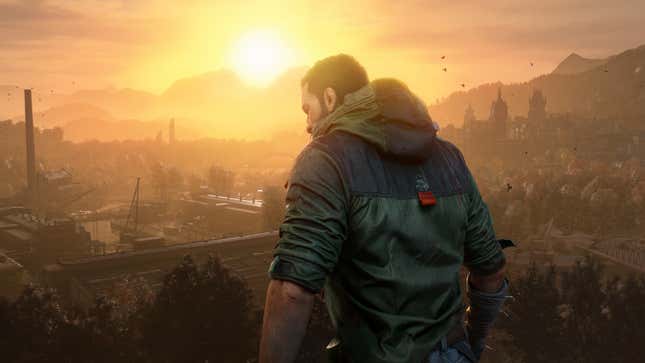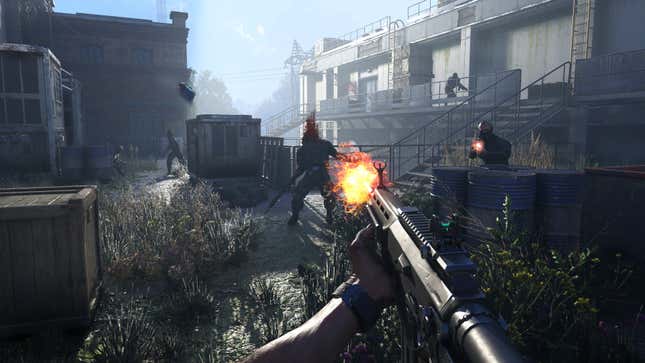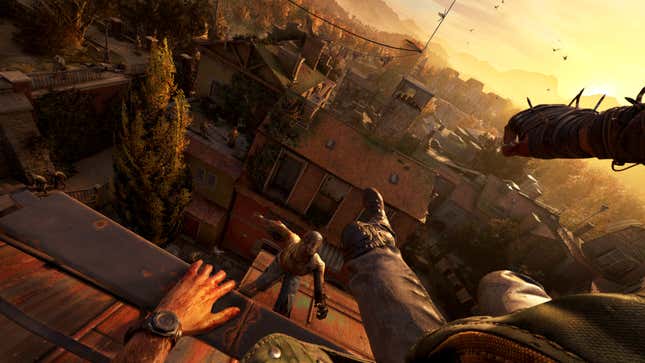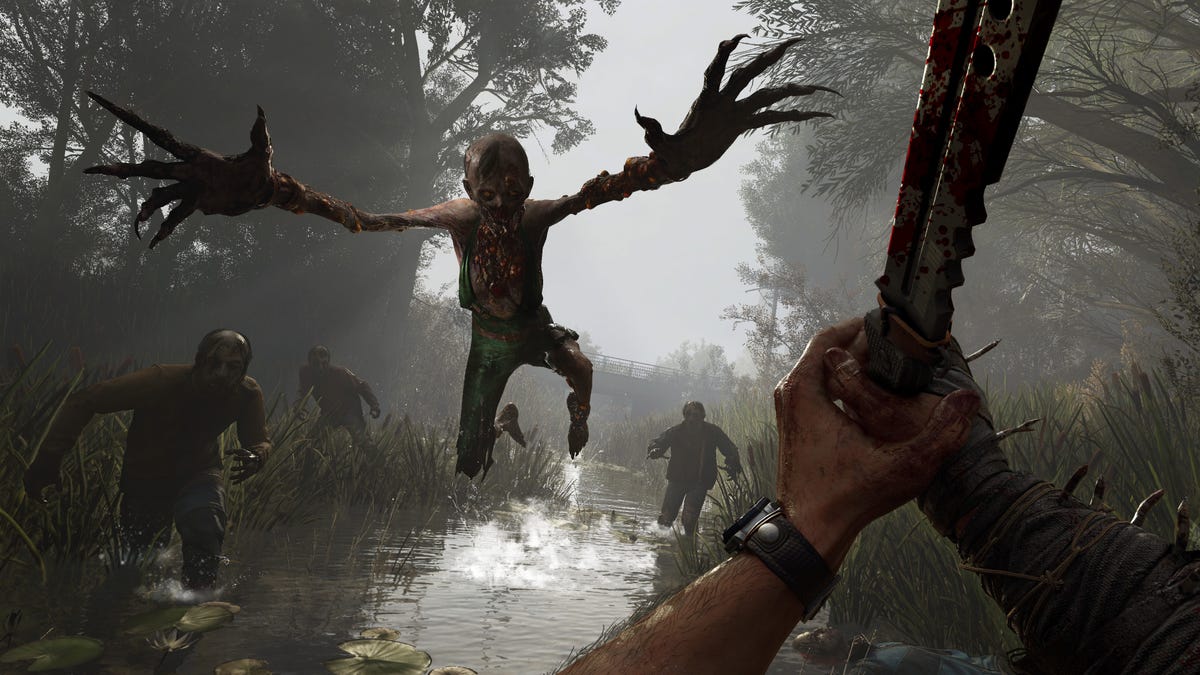How do you know when a DLC isn’t a DLC any more? That was the question that faced Dying Light developers Techland as they worked on the next entry for the long-running zombie-battling parkour franchise. Intended to be the second major piece of DLC for 2022’s Dying Light 2, what has now been announced as standalone release Dying Light: The Beast made this transition through a process of disaster and inspiration.
When I asked the opening question of Tymon Smektala, franchise director of Dying Light, he answered, “When it explodes.” It was a term that came up again and again in my sit-down with Smektala, art director Katarzyna Tarnacka-Polito, and Roger Craig Smith, the voice actor behind Dying Light’s returning original hero, Kyle Crane.
This explosion began with a whimper. During the development of what was intended to be the next DLC, the game’s perhaps…overenthusiastic community managed to unearth and leak details about the narrative plans, spoiling the developers’ intentions and causing an internal rethink. And during that process, people fell in love with the idea of entirely changing directions and bringing back the original hero of 2015’s Dying Light, Kyle Crane, who ended the game in somewhat unfortunate circumstances. This, says Smektala, “was a boost of adrenaline, an injection of something powerful in our arms [and] almost overnight everyone had so many ideas of what we could do, things they really wanted to do to pay homage. And it exploded.”
While this all reads like fairly standard chatter a developer says to the press when doing PR for a game (and you’ll see the same story told on a dozen other sites this week), what doesn’t come across in text is the depth of passion with which everything was delivered. At times during my chat with the team, shortly after watching about 20 minutes of the game being played, both Smektala and Tarnacka-Polito were tearing up, stopping to take breaths, so palpable was their enthusiasm.
As the team moved away from the version of the new content that had been leaked and spoiled, and more toward this new Crane-focused project, eventually it was agreed that what they were making was no longer a DLC. The Beast, in which Crane returns after 10 years of being held and experimented upon by demented scientists, was a full game. At over 18 hours, it’s hard to argue.

During Crane’s decade-long absence, he’s been through a lot. Exactly what is deliberately under wraps, and seemingly a large part of the game’s plot, but what we know for sure is that he was the victim of gruesome experiments in which scientists attempted to splice him with zombie DNA. Given the events that took place at the end of The Following, we can safely assume that one possible ending involving a nuclear warhead is no longer canon, but the other more tantalizingly suggests a Crane who has reason to be compatible with such corrupted genetics.
As a result, he’s now able to enter a beast mode, where his abilities and skills are enormously overpowered. This was demonstrated during a boss fight which began like something from Dark Souls, and ended like an unfairly matched bout in Street Fighter. At the beginning, Crane was taking chips out of this behemothic infected, dashing around and avoiding its massive, thumping arms, whittling away at its health bar. As it called in other zombies to help out, the fight started becoming overwhelming, at which point the Techland demonstrator opted to use Crane’s (limited) beastly powers. At this point the fight was a wholly different affair, Crane now taking chunks out of his foe, picking up vast concrete blocks and lobbing them at the blighter’s head, and made quick work of him. It’s certainly going to change players’ approach.
It’s worth adding that what was shown of The Beast also looked nothing like an overgrown DLC, and that’s in a huge part because of a massive step forward in fidelity. Dying Light 2 was a beautiful game, but The Beast is on a whole other level. That’s in large part due to the extraordinary new weather effects shown in my hands-off demo, with a heavy downpour that felt far more a part of the world than I’ve seen a game manage before. Then, surprising me further, rather than just stopping in that traditional gaming way where God flicks a switch, instead the rain began to slow as patches of blue appeared between the clouds, before it all slowly cleared up. This is, the team told me, dynamic, the game able to introduce weather at its whim, alongside the scripted moments.
This is all a part of an effort to give the new valley location a unique feel following on from the sunnier climes of the previous games. It has the feel of the Pacific Northwest, a fog-ridden and autumnal world still gloriously lit by sunshine, but prone to storms that add a gloom that feels appropriate given the darker nature of our character. “The sound as well,” adds art lead Katarzyna Tarnacka-Polito. “The sound of the rain, I think it’s going to add a lot to the experience.” Again, as I relay this to you, I hear how this reads like the granular details that obsess developers but rarely trouble players, but Tarnacka-Polito is really underselling the impact. When it rains, it affects all the sounds in the game, dulling impacts, with everything re-recorded appropriately. It’s the kind of detail players are unlikely to consciously notice, but—like how a David Fincher film shot through a silver gel feels so much more sullen—it has a significant aesthetic impact.
“Our audio department is crazy,” says Smektala. “When they record combat sounds they take this huge chunk of meat that they hit with many objects. When we worked on The Following [the expansion for the first game], set in more open areas, they were recording what they called ‘the sounds of silence’ in fields, so definitely crazy guys. Every aspect is changed and evolved.”
“I don’t know if you noticed in the demo,” added Tarnacka-Polito, “but the rain sounds different depending on where you are. If you’re standing knee-deep in the water, or if you’re standing in the woods, it sounds completely different. I was not expecting that!”

Where previous Dying Light games have really focused on the series’ trademark parkour, seeing you leap from rooftop to rooftop before dropping into grisly melee battles with the infinite hordes of undead, The Beast looks to be attempting to mix this up too, with the demo showing Kyle take advantage of environmental elements as he attempted to take on rooms packed with zombies (setting oil patches on fire to burn them, then hooking them up to a generator to add electricity to the mix), as well as some surprising FPS gunplay. The developers were keen to make clear this wasn’t a sea-change, but rather an additional element, used when taking on heavily armed human enemies who are controlling large bases. They have the firepower, so once you take it from them, it’s yours to use with a liberal glee that hasn’t ever been possible before in a series that relies so heavily on your improvising weapons from the junk you find lying around. And despite these moments of bullet-happy frivolity, Techland also stressed that this would mark a return to the far more survival-focused nature of the original game, rather than Dying Light 2’s more generous, somewhat easier approach.
Oh, and there are vehicles now as well! Given the studio’s experience in the racing genre, with pre-2010 series like FIM Speedway and Xpand Rally, this was something they felt very comfortable adding, but again made clear this wasn’t going to massively change the way you play. Driving, we were told, is a dangerous choice, with fuel extremely rare, cars very vulnerable to attack, and the chances of breaking down in the worst possible places very high.

But one thing that isn’t changing is the voice of Kyle Crane. Roger Craig Smith, who played the lead role in 2015, is a voice you know. He’s Batman in Arkham Origins, Mirage in Apex Legends, Ezio in Assassin’s Creed, and more than anything else, he’s Sonic in just about everything Sonic (except for the movies) for the last decade. His agreeing to return to play a part he’d assumed was gone for good, given how things had ended ten years earlier, was crucial for the whole project. It was to Techland’s enormous relief that he was up for it. In fact, he was delighted to do it.
Over the years, I’ve learned that it’s not likely that a voice actor will have played the games they’ve acting in, and asking questions can lead to awkward places. But here, it was Smith who dove into memories of playing the original Dying Light, enthusiastically remembering a moment when Crane climbed the enormous tower, and the sound of the wind began to whip around him, and how he experienced a sense of vertigo. “I literally got queasy in my stomach. I realized how high up I was at that moment.” Even he was bubbling with excitement about making this game.
The Kyle Crane we meet in The Beast is, as mentioned, not the same man, and it was really important to everyone involved that this be demonstrated in his voice. After some early recording sessions, Smith said that Smektala gave him feedback, saying it wasn’t yet right. Without naming names, he said that he’s worked with other studios whose direction would be no more than, “Yeah, just do it like you did!” “It’s not a service to the fans,” said the actor, “so it’s always neat to be a part of something where you’ve got people who are so passionate, dedicated to wanting to get it right.”
Did he get to go beast mode in the recording booth? He laughs and says yes, talks about the fun of doing the transitions, and adds, “You can only go there so many times before your voice is trashed. So we’ve been very strategic in how we’re doing the sessions, saying ‘Hey, this is going to be a lot of effort. Are we doing the Beast? OK, we’ll save that to the end.’”
And he’s not the only one who’s glad he’s back. Tarnacka-Polito looked at Smith and said, “When we make the game and we play it, over and over again, for hundreds of hours, and hearing you in my head for so long—when I heard you again for the first time, after so long, was [gulps] so powerful.”
It’s a lot of fun to be in a room with developers who are so genuinely hyped about their own game. At events like Gamescom, you meet a lot of developers going through the motions, saying the PR-approved statements until your regimented slot is up, then doing it over and over, all day long. Perhaps I got lucky by seeing them early in the week, but their passion was so palpable, it was infectious.
It’s too early to say if that will translate to the experience of playing the game. This was all hands-off, and as impressive as it all looked, so much will depend on seeing if the game maintains that crucial sense of flow and fear that has made the previous games well worth playing, while adding in so many new elements.
But in an impressive move, those who bought the ultimate edition of Dying Light II won’t have to pay to find out. In a move that very sensibly prevents what could have been a tiresome debacle, despite the game being a mutation of what was once meant to be a DLC, Techland are honoring the original intention of the project and giving it for free to those customers.

